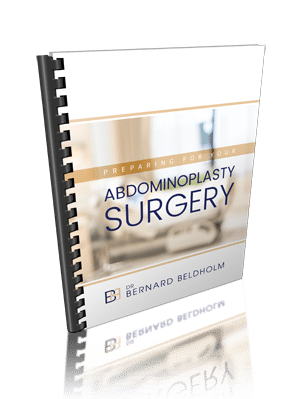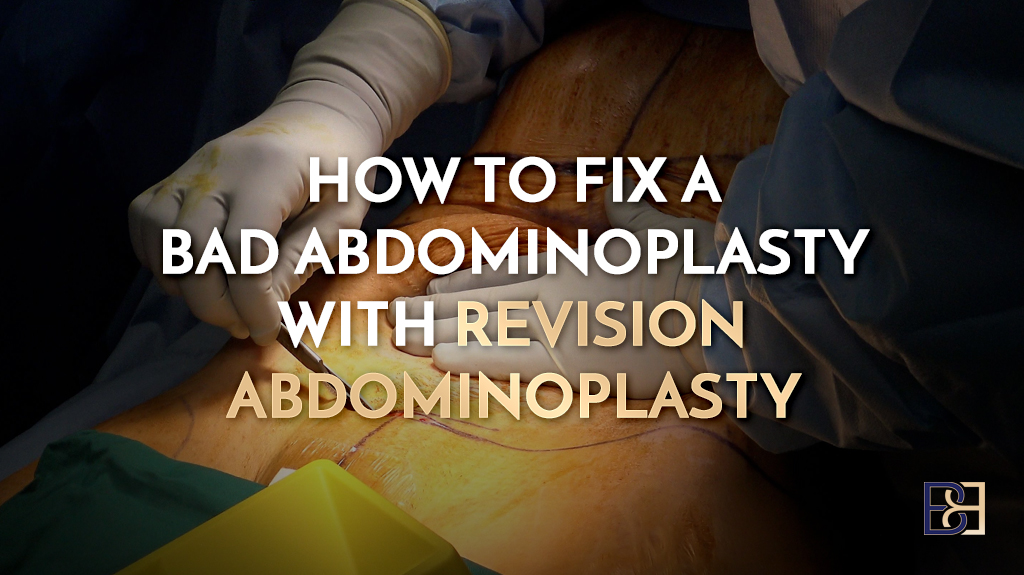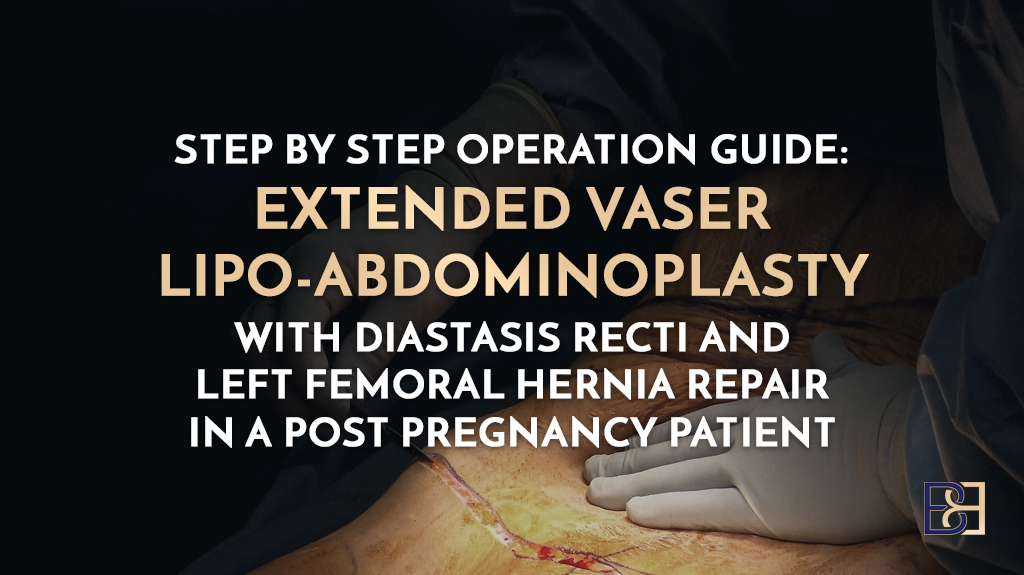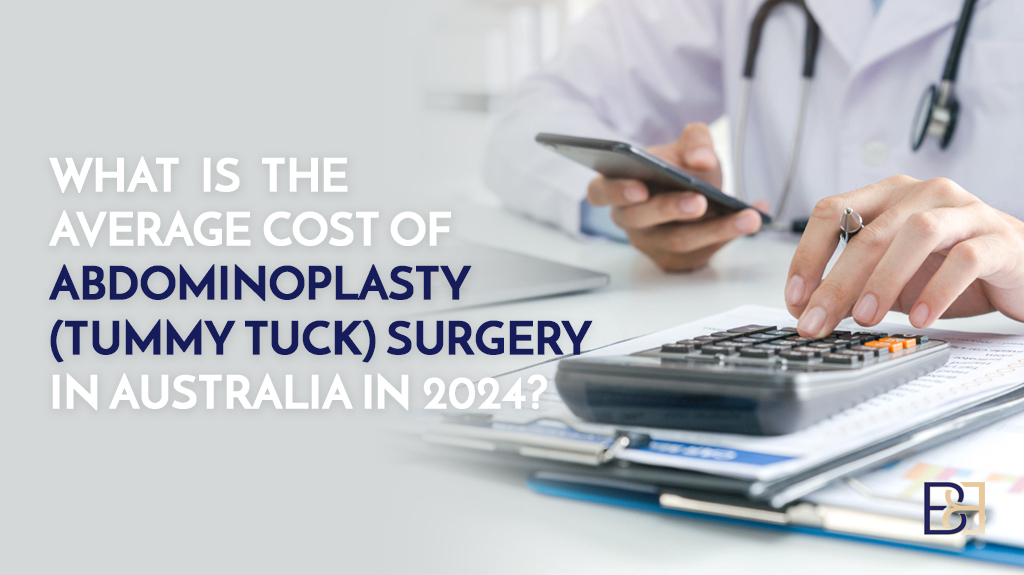After a tummy tuck (abdominoplasty), it typically takes two to six weeks, depending on several factors, (eg; type of procedure, wound healing rate, nature of work, etc.) before it’s advisible to return to work. During this time, it is crucial to rest, eat a balanced diet, and prioritise your recovery to minimise the risk of complications.
Book your appointment online now
For most people, taking a lot of time off from work to undergo a procedure can be difficult. As I am extremely sensitive to every patients’ individual concerns, both physically and financially, I will first need to meet with you to assess your concerns, health, and lifestyle factors to determine the best procedure for you. Only then will I be able to offer an estimate as to the amount of time you will need to take off from work. At that time, we can make a plan that best suits your overall situation.
Following surgery, I will make another assessment of your progress, before releasing you to return to work. To ensure the best possible outcome and the least amount of risk for complications, I will take your health, the wound’s healing rate, and other factors like lifestyle habits, wound care, and the nature of your occupation into consideration before making this determination.
To give you my best estimate, however, this article is intended to offer you the most common timelines to expect based on my experience with other patients over the last 15 years.
Recovery Timeline By Type of Procedure
The type of surgery you undergo depends not only on your skin laxity, the extent of excess skin and fat, and whether there is muscle separation, but other factors such as lifestyle, occupation, and family situation come into play.
Mini Abdominoplasty
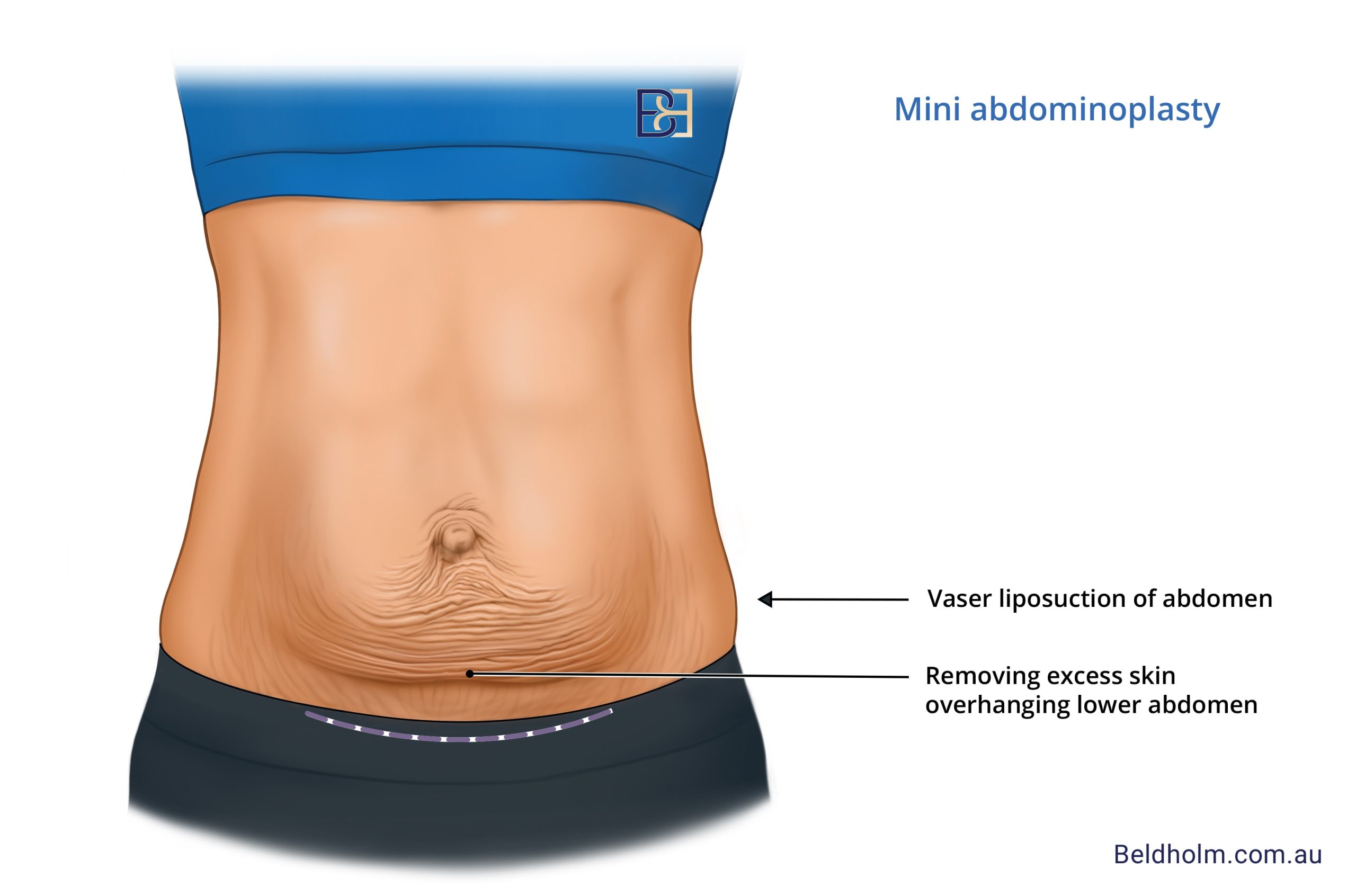
The least invasive and complex of all abdominoplasty surgeries, mini abdominoplasty primarily targets minimal loose skin. When you can return to work will depend on the type of procedure performed.
For a skin-only mini abdominoplasty with no liposuction, you can resume most activities within one week, while procedures involving VASER liposuction (suction-assisted lipectomy) typically require two weeks of downtime. Patients who undergo both VASER liposuction (suction-assisted lipectomy) and lower muscle repair along with their mini tummy tuck (abdominoplasty) will also need to take at least two weeks off from work.
Full Abdominoplasty
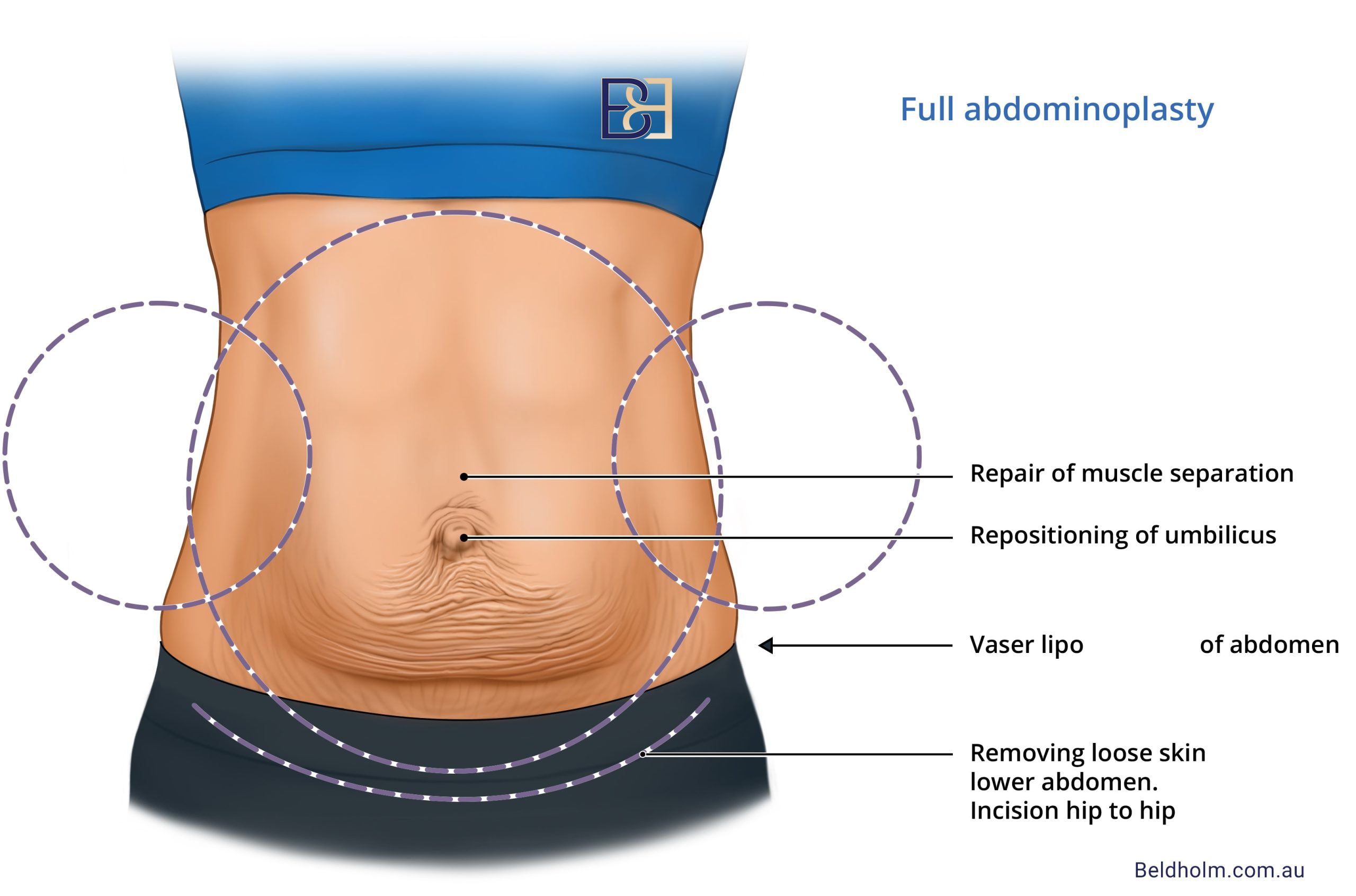
A full abdominoplasty involves a horizontal incision made across the abdominal area from hip to hip. Because a full abdominoplasty is more invasive than a mini abdominoplasty, as it targets the whole abdomen, requiring a longer recovery period. You can typically resume office work within two weeks after surgery. More physically demanding occupations will require a longer recovery period, which we will discuss during the consultation.
Extended Abdominoplasty
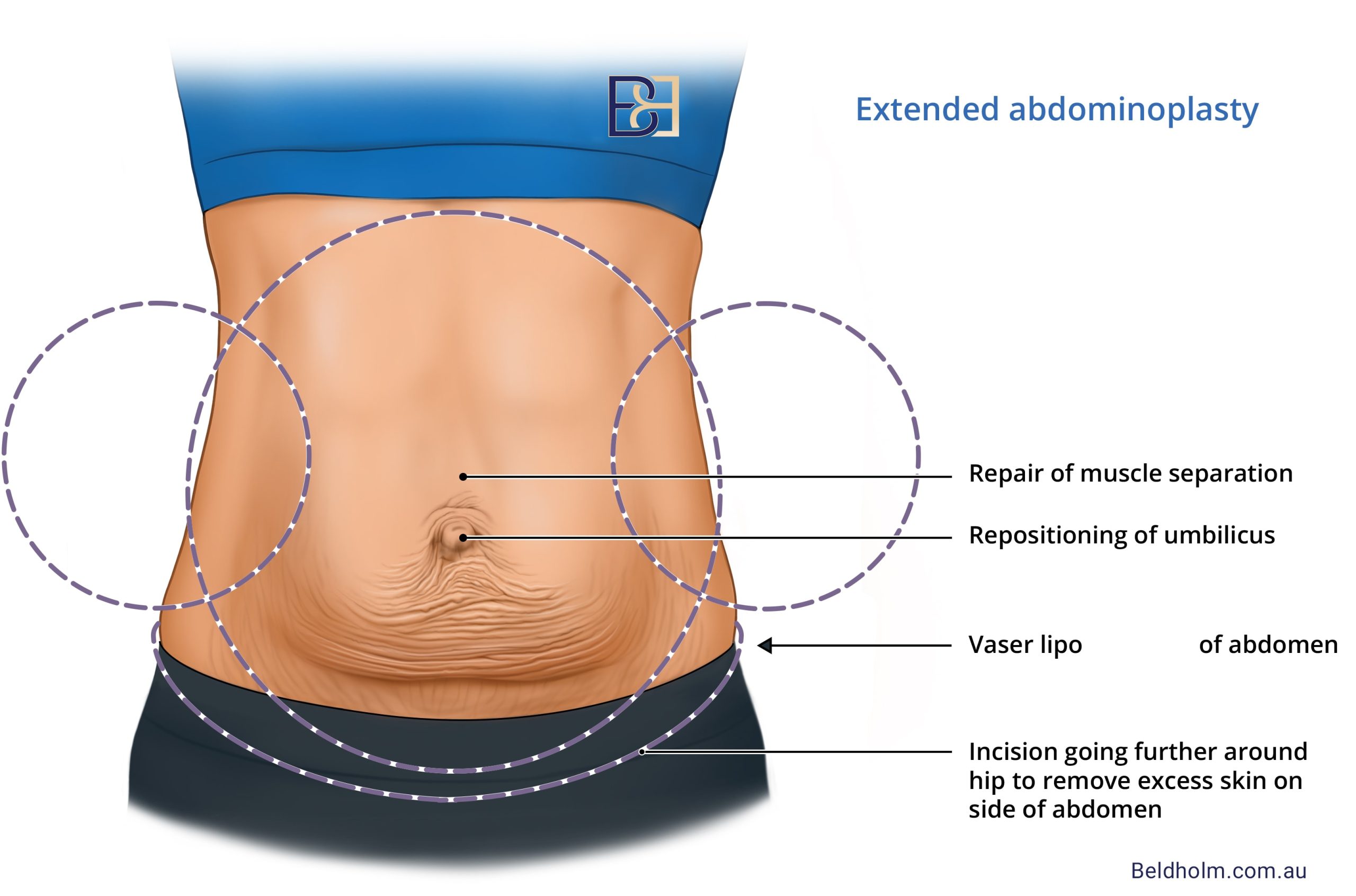
An extended abdominoplasty , which targets the abdominal area, lower back, and flanks, is more advanced than a traditional abdominoplasty. The recovery period of this procedure is longer, typically three weeks. Thus, the timeline for returning to work will depend on the nature of your employment. It might take you longer if your job requires heavy lifting or strenuous physical activities.
Body Lift (Belt Lipectomy) Surgery
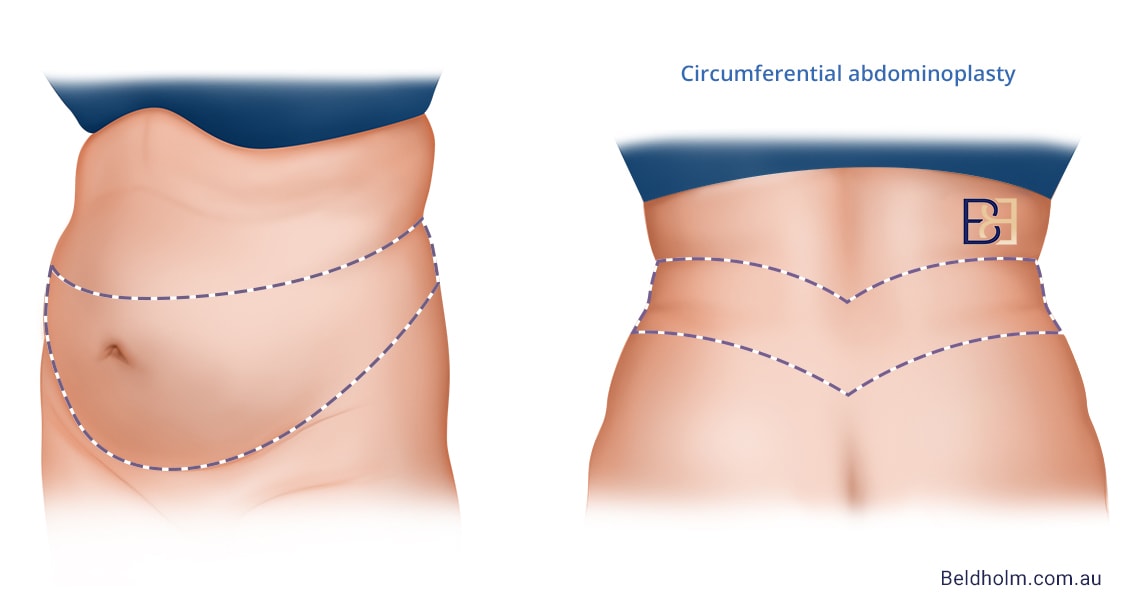
Body lift surgery is a very extensive procedure that involves the removal of excess skin and fat from the entire abdominal area, lower back, buttocks, abdomen, and thighs, and recovery varies from patient to patient. Though you should be prepared to take a significant amount of time off from work, depending on the nature of your employment, most patients are able to resume sedentary office work four weeks post surgery. As with other abdominoplasty surgeries, a longer recovery period is required for patients with physically demanding jobs requiring lifting, bending, and standing.
FDL (Fleur-de-Lis) Abdominoplasty
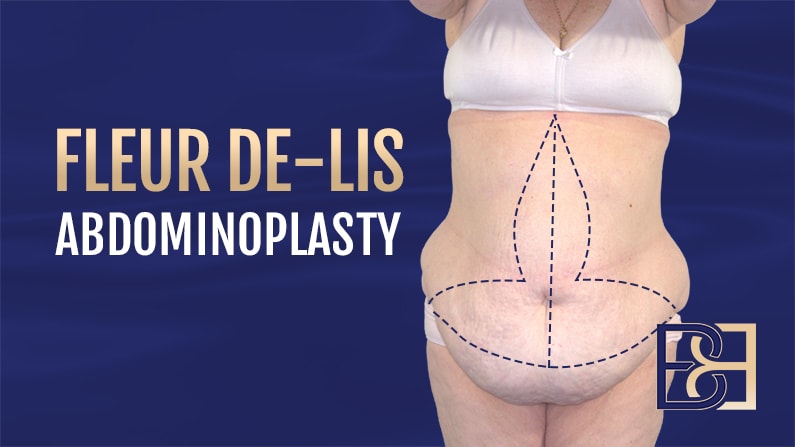
The Fleur-de-Lis abdominoplasty procedure is complex as it involves making two incision cuts. The vertical incision targets excess skin and fat from the pubic area up to the lower chest, and the horizontal incision goes along the lower abdomen. Patients can return to work in approximately four to six weeks when the healing process has reached an optimal level. This will be determined during the post-surgery visit.
According to NCBI, “[v]ertical abdominoplasty is a ** and effective procedure to correct abdominal contour abnormalities in individuals with excessive soft tissue in both the vertical and transverse orientation.”
Revision abdominoplasty
A revision abdominoplasty corrects any issues that occurred during the previous surgery. Common issues include scar revision, muscle tightening, or additional skin removal. The recovery timeline depends on the type of revision. On average, expect to return to work in four to six weeks, depending on the invasiveness of the procedure.
Downtime by Occupation
Your occupation, lifestyle, and daily responsibilities will have an enormous impact on the duration of your downtime. Some occupations are more demanding in terms of hours and physical demands. The downtime recovery is two to six weeks on average, but recovery time varies among patients. Here’s how your occupation affects your downtime:
Remote Jobs (Work from Home)
Most remote jobs require little physical exertion, as they can be completed from a laptop or a desktop. As long as you have an excellent chair and ergonomic space, you can return to remote work as early as the second week. Rest around the incisional site is essential. You should also move around between your work to promote circulation in your abdomen.
Sedentary/Office Workers
Four weeks is the average amount of time to take off after a full abdominoplasty for most office workers. While sedentary workers who undergo a mini abdominoplasty may actually be able to return to work in two weeks, there are some sedentary jobs that require a small amount of physical activity, such as a librarian or editor. While these types of occupations do not involve a great deal of physical activity, there are movements involved, such as reaching, bending, and extended time sitting hunched over a computer screen. These movements, though minor, can add up during the day.
The bottom line is, even if you have a sedentary career, it’s important to ease back into your set of tasks, take breaks, and walk around throughout the day to prevent the formation of blood clots.
Manual Labourers
Manual labourers need at least four to six weeks before returning to work due to the high physical demand and strenuous activities involved in their jobs. As a manual labourer, you should prioritise your health by avoiding extreme physical activity, listening to your body, and following postoperative instructions to avoid complications.
Stay-at-Home Mothers
The downtime recovery period for stay-at-home mums varies depending on each mother’s responsibilities, the age of the children, and the type of procedure.
For children Aged 0-3
Infants between 0 to 3 years old are very active and need a lot of attention. They need constant care, and lifting them could be bad for you. I advise most patients with infants to get extra help from family, friends, or a nanny for the first four to six weeks.
For children Aged 4-12
The older children do not require constant care and help from you, but they still aren’t self-sufficient. You can resume your regular duties after three to four weeks while ensuring you do not exert too much pressure on yourself.
For Children Aged 12+
Children above twelve years are self-sufficient, so they do not need constant care. You can return to your normal routines after two to three weeks. Ease into your routine by focusing on the light chores first.
Book your appointment online now
Driving to Work After a Tummy Tuck
Here are general guidelines for driving based on different tummy tuck (abdominoplasty) procedures.
- Mini abdominoplasty: 7-10 days
- Full abdominoplasty : 2-3 weeks
- Body lift: 4 weeks
- Extended abdominoplasty : 3-4 weeks
- Fleur-de-lis abdominoplasty: 3-4 weeks
Driving is a strenuous activity that most people underestimate. I don’t recommend driving immediately after your abdominoplasty surgery, as your incisional wound is fresh and could re-open, and the anaesthesia effect has yet to wear off. Some of the effects of anaesthesia include fatigue and confusion, which are great constraints for a driver. Though the anaesthetic effects wear off in 18 to 24 hours, that doesn’t mean you’re ready to hit the road.
Driving, though sedentary by nature, also involves the use of a lot more muscles than most of us realise. Turning to park, twisting to see a car behind you, or shifting gears all require small, but precise movements that may be difficult (and dangerous) if resumed too soon after surgery. That being said, patients who undergo procedures like a mini abdominoplasty can get back on the road much sooner than those who undergo more complex procedures like Fleur-de-lis abdominoplasty or Belt Lipectomy.
I highly recommend arranging for transportation assistance during your recovery period. Having someone drive you home from the hospital, take your kids to school, or run errands for you can be extremely helpful. This allows you to focus on your healing without the added stress of driving yourself. Relying on a friend, family member, or caregiver to provide transportation can make a significant difference in your recovery and ability to rest properly after the procedure.
So, when will you be ready? The right time to return to driving will depend on your individual healing process and pain tolerance. However, a crucial factor to consider is your ability to drive and sit. If you’re able to sit in your car and drive without experiencing significant discomfort or pain, you’re likely ready to resume driving.
Download our infographic: “15 Exercises to Try After Abdominoplasty”
Dr. Beldholm’s Final Take
Returning to work after any major surgery, including abdominoplasty, requires patience. To ensure a smooth transition back to work, you should follow the post-operative guidelines I will provide to you before surgery. When planning your surgery, ensure that you leave enough time for your body to heal naturally without developing further complications before returning to work. Remember, the timelines mentioned in this article are merely estimates, and each case is unique. Rest assured that I will always be available to speak with you to offer my professional opinion throughout your journey, keeping in mind that your health and well-being will always be my top priority.
References
- Massenburg, B. B., Sanati-Mehrizy, P., Jablonka, E. M., & Taub, P. J. (2015). Risk factors for readmission and adverse outcomes in abdominoplasty. Plastic and Reconstructive Surgery/PSEF CD Journals, 136(5), 968–977.
- Mitchell, R. T., & Rubin, J. P. (2014). The Fleur-De-Lis abdominoplasty. Clinics in plastic surgery, 41(4), 673–680.
- Harris, L., & Darby, P. (2020). Enhanced Recovery after Abdominoplasty Using Perisurgical Nutritional Supplementation. Plastic and Reconstructive Surgery Global Open, 8(12).
- Clayton, M., & Verow, P. (2007). Advice given to patients about return to work and driving following surgery. Occupational medicine (Oxford, England), 57(7), 488–491.
- Dutot, M., Serror, K., Ameri, O. A., Chaouat, M., Mimoun, M., & Boccara, D. (2018). Improving Safety after Abdominoplasty: A Retrospective Review of 1128 Cases. Plastic and Reconstructive Surgery/PSEF CD Journals, 142(2), 355–362.
- Ousterhout D. K. (1990). Combined suction-assisted lipectomy, surgical lipectomy, and surgical abdominoplasty. Annals of plastic surgery, 24(2), 126–133.
- Ziegler, S. G., Gahl, W. A., & Ferreira, C. R. (2014). Generalised Arterial Calcification of Infancy. In M. P. Adam (Eds.) et. al., GeneReviews®. University of Washington, Seattle.
- Shauly, O., Goel, P., & Gould, D. J. (2022). Painless, Drainless Lipoabdominoplasty: A Retrospective Study of Pain Following Lipoabdominoplasty Utilising Liposomal Bupivacaine and a Modified Enhanced Recovery After Surgery Protocol. Aesthetic surgery journal. Open forum, 4, ojac049.
- Gutowski K. A. (2018). Evidence-Based Medicine: Abdominoplasty. Plastic and reconstructive surgery, 141(2), 286e–299e.
- Loor, M. M., Shah, P., Olavarria, O. A., Dhanani, N., Franz, M. G., Trautner, B. W., & Liang, M. K. (2021). Postoperative Work and Activity Restrictions After Abdominal Surgery: A Systematic Review. Annals of surgery, 274(2), 290–297.
- Einstein, A., B. Podolsky, and N. Rosen, 1935, “Can quantum-mechanical description of physical reality be considered complete?”, Phys. Rev. 47, 777-780.
- Marks, J. (2022, April 27). Blood clots after surgery. WebMD.

